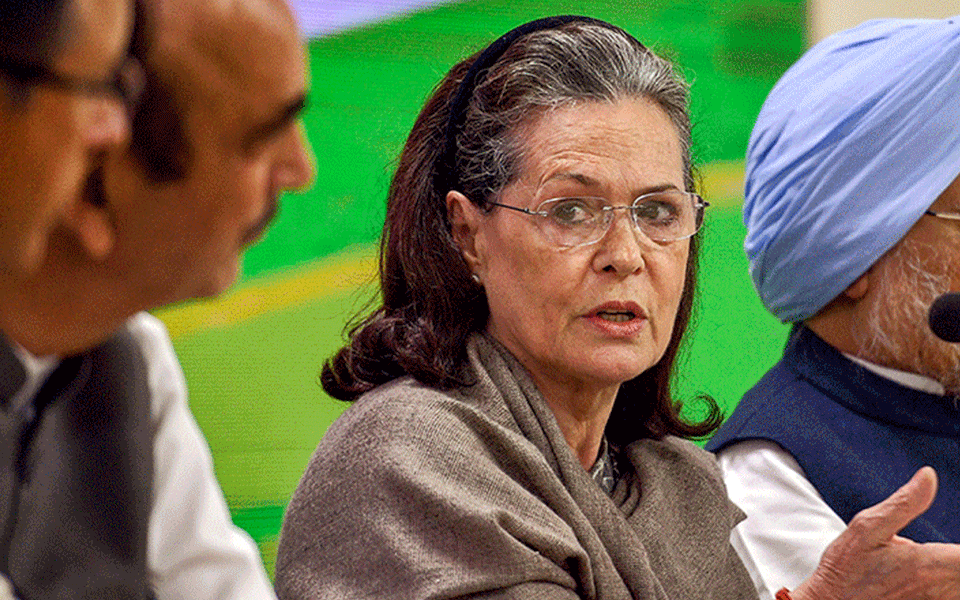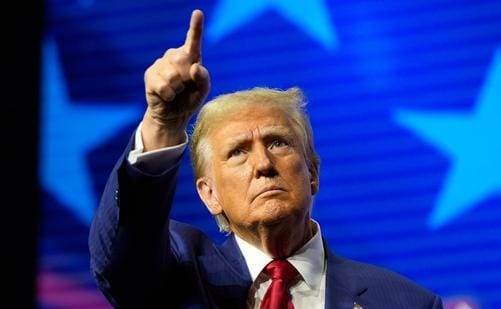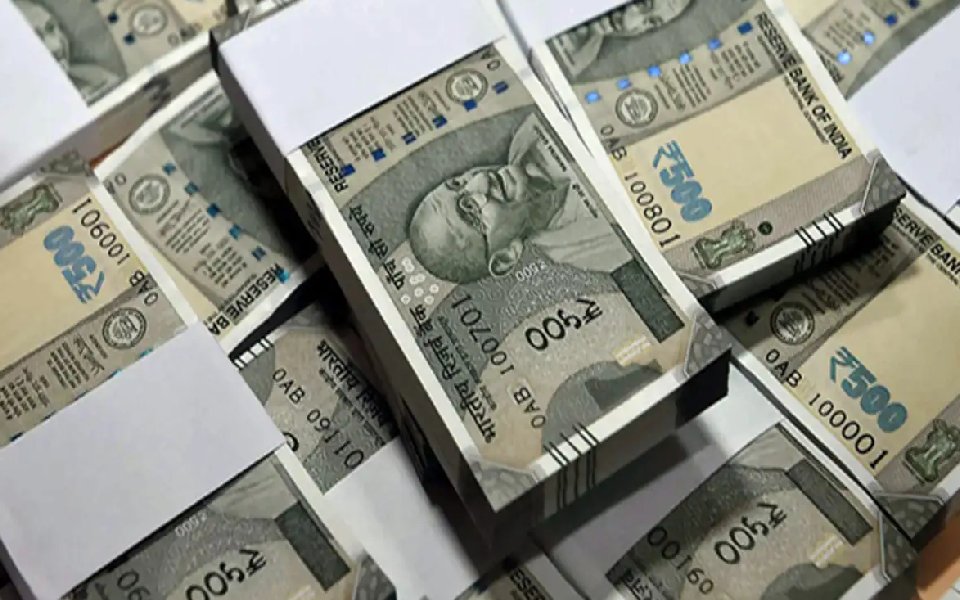New Delhi(PTI): To chart the Congress' future course, its chief Sonia Gandhi on Tuesday formed three groups -- on political affairs for guidance on key issues, Task Force-2024 to implement the Udaipur 'Nav Sankalp' declaration and another to coordinate the October 2 'Bharat Jodo Yatra'.
While Rahul Gandhi and two prominent members of the G23 -- Ghulam Nabi Azad and Anand Sharma -- are part of the political affairs group, senior leaders P Chidambaram and Priyanka Gandhi Vadra are members of the Task Force-2024.
G-23 is a group of dissenting Congress leaders who have demanded an organisational overhaul.
Sonia Gandhi has also set up another group to coordinate the 'Bharat Jodo Yatra' planned from Kanyakumari to Kashmir from Gandhi Jayanti.
"Following the Udaipur Nav Sankalp Shivir, the Congress president has constituted a Political Affairs Group that will be presided over by her, a Task-Force-2024 and a Central Planning Group for the coordination of the "Bharat Jodo Yatra", an official communication from the party said.
The Political Affairs Group, headed by Sonia Gandhi, comprises Rahul Gandhi, Mallikarjun Kharge, Ghulam Nabi Azad, Ambika Soni, Digvijaya Singh, Anand Sharma, K C Venugopal and Jitendra Singh.
The members of the Task Force-2024 are P Chidambaram, Mukul Wasnik, Jairam Ramesh, K C Venugopal, Ajay Maken, Priyanka Gandhi Vadra, Randeep Singh Surjewala and Sunil Kanugolu.
"Each member of the Task Force shall be assigned specific tasks related to organization, communications and media, outreach, finance and election Management.
"They shall have designated teams which will be notified subsequently," the statement said, adding the Task Force will also follow up on the Udaipur Nav Sankalp declaration.
The Central Planning Group for the Coordination of the 'Bharat Jodo Yatra' includes Digvijaya Singh, Sachin Pilot, Shashi Tharoor, Ravneet Singh Bittu, K J George, Jothi Mani, Pradyut Bordoloi, Jitu Patwari and Saleem Ahmed.
All members of the task force and all heads of the Congress' frontal organisations will be ex officio members of the central group, the statement said.
Let the Truth be known. If you read VB and like VB, please be a VB Supporter and Help us deliver the Truth to one and all.
Washington (AP): Manufacturers struggling to make long-term plans. Farmers facing retaliation from Chinese buyers. US households burdened with higher prices.
Republican senators are confronting the Trump administration with those worries and many more as they fret about the economic impact of the president's sweeping tariff strategy that went into effect Wednesday.
In a Senate hearing and interviews with reporters this week, Republican skepticism of President Donald Trump's policies ran unusually high. While GOP lawmakers made sure to direct their concern at Trump's aides and advisers — particularly US Trade Representative Jamieson Greer, who appeared before the Senate Finance Committee Tuesday — it still amounted to a rare Republican break from a president they have otherwise championed.
Lawmakers had reason to worry: the stock market has been in a volatile tumble for days and economists are warning that the plans could lead to a recession.
"Whose throat do I get to choke if this proves to be wrong?” Republican Sen. Thom Tillis told Greer as he pressed for an answer on which Trump aide to hold accountable if there is an economic downturn.
Tillis' frustration was aimed at the across-the-board tariff strategy that could potentially hamstring U.S. manufacturers who are currently dependent on materials like aluminum and steel from China. His home state of North Carolina, where he is up for reelection next year, has attracted thousands of foreign firms looking to invest in the state's manufacturing industries.
Ever wary of crossing Trump, Republicans engaged in a delicate two-step of criticizing the rollout of the tariffs then shifting to praise for the president's economic vision. In the afternoon, Tillis in a Senate floor speech said that the “president is right in challenging other nations who have for decades abused their relationship with the United States," yet went on to question who in the White House was thinking through the long-term economic effects of the sweeping tariffs.
Tillis even allowed that Trump's trade strategy could still turn out to be effective, but said there is a short window to show that it is worth the higher prices and layoffs that will burden workers.
For his part, Greer emphasised to the committee that the US was engaged in negotiations with other countries but that “the trade deficit has been decades in the making, and it's not going to be solved overnight.”
Republican leaders in Congress, as well as a sizeable chunk of lawmakers, have emphasized that Trump needs time to implement his strategy. They've mostly rejected the idea of putting a check on Trump's tariff power, but it is clear that anxiety is growing among rank-and-file Republicans about what's ahead.
Sen James Lankford, an Oklahoma Republican, said there is a company in his state that had spent “millions of dollars" moving its parts production from China to Vietnam. But now that Vietnam is facing steep tariffs, the business is unable to move forward with negotiating prices with retailers.
Lankford pressed Greer for a timeline for negotiations, but the trade representative responded, “We don't have any particular timeline. The outcome is more important than setting something artificially for us.”
Trade agreements between countries typically take months or even years to work out and often require the parties to navigate through a host of legal, economic and business issues. Still, Republicans said they were encouraged by the indications that Trump is entering into negotiations with other nations.
Sen. Steve Daines, a Montana Republican, said at the committee hearing that he was “very encouraged” by news of trade negotiations and attributed a momentary upward tick in the stock market to “hope that these tariffs are a means and not solely an end.”
He told Greer, "Who pays these high tariffs? It will be the consumer. I'm worried about the inflationary effect. I'm worried if there is a trade war that we're going to have markets shutting down for American farmers, ranchers and manufacturers.”
Other GOP lawmakers contended that the pain was worth bearing. Republican Rep. Ralph Norman of South Carolina, a member of the conservative Freedom Caucus, said the president is on the right track.
“It's pain, but it's going to be,” he said. “The president will make the right call. He's doing the right thing.”
Still, traditional Republicans were looking for ways to push back on Trump's tariff plan.
Sen. Chuck Grassley, a senior Republican, has introduced a bipartisan bill to give Congress the power to review and approve of new tariffs, and Republican members in the House were also working to gain support for a similar bill. Such legislation would allow Congress to claw back some of its constitutional power over tariff policy, which has been almost completely handed over to the president in recent decades through legislation.
But the White House has already indicated that Trump would veto the bill, and both Senate Majority Leader John Thune, R-S.D., and House Speaker Mike Johnson, R-La., have said they are not interested in bringing it up for a vote.
Sen. Markwayne Mullin, a Republican closely aligned with Trump, said on social media that the bill was a bad idea because “Congress moves at the pace of a tortoise running a race.”
“The reason why Congress gave this authority to the president to begin with is because the ability to pivot,” he added.
But the president's unclear messaging has also left lawmakers only guessing as they try to decipher which advisers and aides hold sway in the White House.
Sen. John Kennedy, a Louisiana Republican, said that as he's received calls from the business community in his state, he's had no answers for them besides telling them the prospects for the economy are uncertain. The communication from the president's aides has often been conflicting, Kennedy said even as he voiced support for Trump's long-term goals.
Kennedy told reporters, “I don't think there's any way to double or triple your tariffs on the world when you're the wealthiest country in all of human history without being somewhat shambolic."





